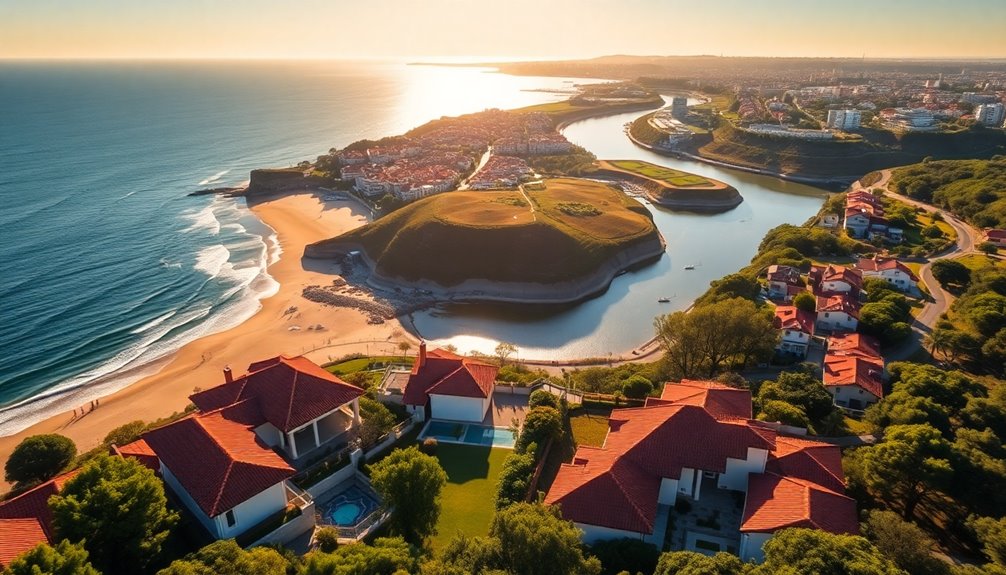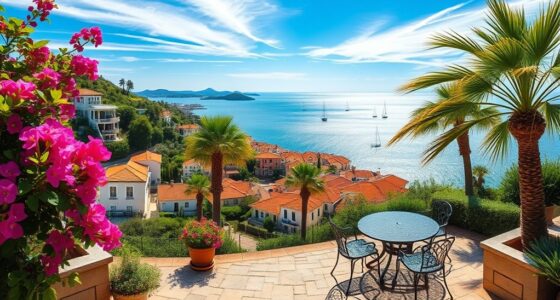Buying property in Portugal opens doors to exciting opportunities, like securing a Golden Visa or investing in stunning coastal and urban homes. You'll need essential documents like a valid ID and Energy Certificate. Start with market research, then negotiate the price and sign a promissory contract. Be mindful of financing options, as mortgage rates can vary. Golden Visas now focus on commercial properties due to changes since 2022. Coastal regions like the Algarve and bustling cities like Lisbon offer attractive investment potential. There's so much to explore in this vibrant market, and your journey has only just begun.
Key Takeaways
- Understand the property buying process, including essential documents like the Contrato Promessa de Compra e Venda and energy certificates.
- Explore financing options with maximum loan-to-value ratios of up to 90% and consider additional costs such as insurance and taxes.
- Consider the Golden Visa Program, which requires a minimum €500,000 investment for residency through property investment.
- Investigate coastal regions like the Algarve and Silver Coast for lucrative property investments and high rental yields.
- Stay informed about market trends, including changes in Golden Visa eligibility and urban property demand post-COVID-19.
Essential Documents and Requirements
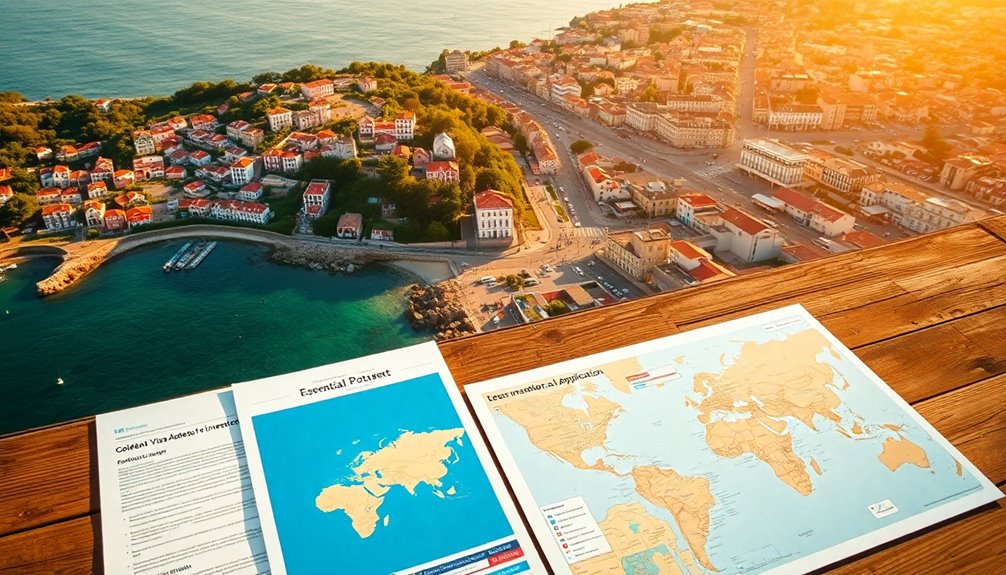
When buying property in Portugal, you'll need to gather several essential documents to secure a smooth transaction.
Start with a valid photo ID, which verifies your identity. The Contrato Promessa de Compra e Venda (CPCV) is vital, as it outlines the terms and conditions of your purchase.
Don't forget to request the Energy Certificate from the seller, as it details the property's energy efficiency.
You'll also need an Imposto de Selo (Stamp Duty Certificate), which is proof of your stamp duty payment to the Tax Authority.
The Caderneta Predial (Land Registry Certificate) will provide important information about the property, such as location and boundaries.
On the financial side, obtain your NIF (Número de Identificação Fiscal), a Portuguese tax number necessary for banking and transactions. Additionally, keep in mind that average asking prices for properties can vary significantly across regions, affecting your financial planning.
A recent bank statement showing the remaining balance for the purchase price is important.
Make sure you have the IMT and IS receipts for your transfer tax and stamp duty payments.
Finally, remember to set aside funds for notary fees and to open a bank account in Portugal, as it's required for your property purchase transactions.
Step-by-Step Buying Process
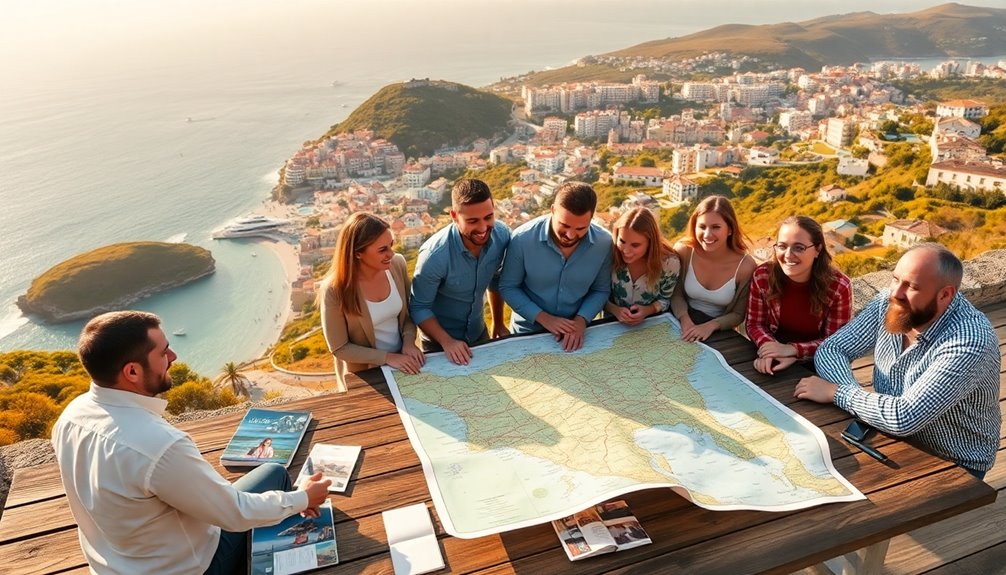
Once you've completed the initial steps, it's time to negotiate the purchase price and move forward with signing legal contracts. You'll need to understand the property registration process to guarantee everything is in order. Additionally, it is crucial to ensure compliance with local property laws to avoid any legal issues down the road. Let's break down what you need to do next.
Negotiating Purchase Price
Negotiating the purchase price of a property in Portugal requires careful preparation and strategic thinking. Start by researching market prices in your desired area. Review recent sales data to determine the fair market value and consult local real estate agents for their insights. Check online listings to compare similar properties and understand how location, condition, size, and age affect prices.
Next, understand the property's value. Hire a professional appraiser to identify any potential issues and assess the property's condition. Unique features and the seller's urgency can also impact the price, so factor these into your evaluation. Additionally, consider that foreigners can buy property in Portugal with no restrictions, making it an attractive option for investment.
When making an offer, craft a compelling proposal that includes a personalized letter to the seller. Highlight attractive factors, like your flexibility with the closing timeline. Start with a price slightly below your maximum budget, allowing room for negotiation. Ascertain your offer is fair to be positively received.
Throughout the negotiation, approach discussions respectfully and collaboratively. Asking for a price reduction of 5-10% is reasonable without offending the seller. Be patient and persistent; negotiations may take time. If needed, consider revising your offer or exploring alternative terms to reach an agreement.
Signing Legal Contracts
Signing legal contracts in Portugal is an imperative step in the property buying process that requires careful attention to detail.
Once you've negotiated the price, you'll start with a €6,000 reservation deposit, which shows your commitment and takes the property off the market. This deposit is often managed by your lawyer, making sure everything is in order. Property taken off market upon deposit submission ensures that no other potential buyers can interfere with your purchase.
Next, you'll move to the promissory contract of sale and purchase, a legally binding document that outlines vital details, such as:
- The agreed purchase price and payment terms
- An inventory list of included items, like furniture
- Obligations and rights of both you and the vendor
You'll typically pay a deposit of 10-30% when signing this contract, so make certain you understand all terms.
Finally, the process culminates with the Public Deed signed in front of a notary, where you'll pay the remaining balance and receive certified copies of the deed.
Each step is vital, so take your time to make sure everything is clear and satisfactory before proceeding.
Property Registration Process
The property registration process in Portugal is crucial for securing your ownership and guaranteeing all legalities are addressed. Start by conducting thorough market research to identify properties of interest. Once you've chosen a few, inspect them to evaluate their condition and location.
It's essential to hire a professional for a legal check to confirm the property's status and identify any issues. Next, obtain your tax number (NIF), especially if you're a non-resident, as you'll need a fiscal representative.
Pay a reservation deposit, usually 10-30% of the property's value, to secure the property. Afterward, sign a preliminary sale agreement that outlines the deal's terms. You'll need to settle municipal property transfer tax and stamp duty before the final agreement.
Gather necessary documents and guarantee everything is in order for the registrar. Submit the deed to the property registry (Conservatória do Registo Predial). The registrar will assess your application, and once approved, your property will be officially registered, ensuring compliance with legal provisions throughout the process.
You'll receive a registration certificate within one to two weeks, confirming your ownership. Finally, update utility accounts and records with the Tax Office and Land Registry.
Exploring Financing Options

When considering buying property in Portugal, exploring financing options is essential for making informed decisions. Understanding the loan-to-value (LTV) ratios set by banks can greatly impact your purchase. While the maximum LTV can reach up to 90%, many banks prefer offering around 80%. In cities like Lisbon, you might even find LTVs as low as 70%.
Here are key factors to keep in mind:
- Mortgage Types: You can choose from variable-rate, fixed-rate, or mixed-rate mortgages, with terms ranging from 3 to 30 years.
- Income Requirements: Banks require proof of stable income and may ask for several months of bank statements and tax returns.
- Additional Costs: Don't forget about mandatory life insurance, valuation fees, and property taxes that can add to your initial expenses. Additionally, comprehensive property evaluations conducted by banks ensure the value of the home aligns with your financing needs.
Be sure to account for these elements as you engage in financing. Knowing what to expect will help you navigate your property purchase with confidence and clarity.
Understanding the Golden Visa Program
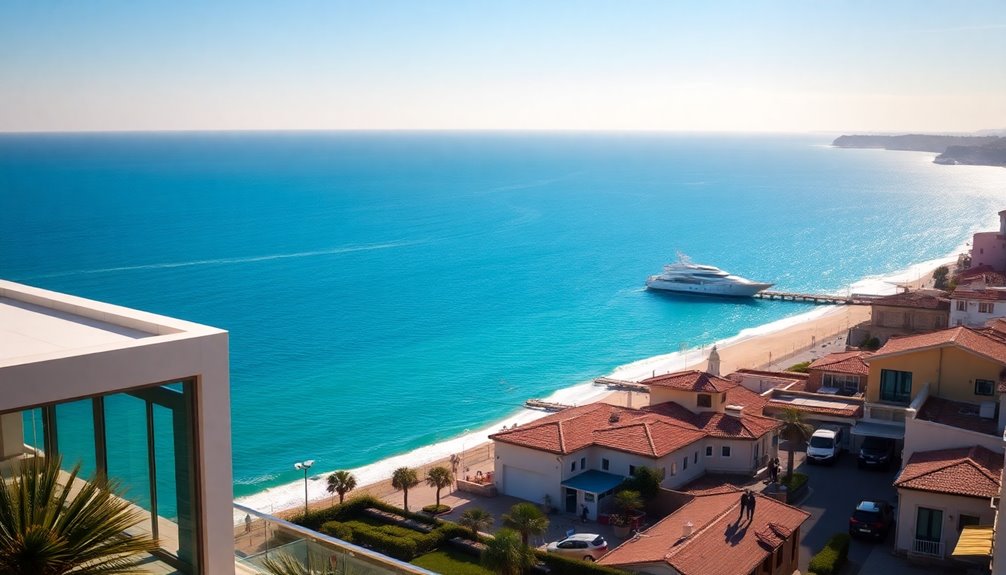
Investing in property in Portugal not only involves understanding financing options but also opens doors to the Golden Visa Program, which offers significant benefits for non-EU citizens.
This program allows you to secure residency by meeting certain investment criteria, which can include donating as little as €250,000 for cultural projects or €500,000 in venture capital funds. As of October 2023, real estate purchases are no longer accepted as an investment option.
You can also include family members like your spouse, dependent children, and parents in your application.
The process starts with an online submission to AIMA, followed by an in-person interview. Once approved, you'll receive a residence permit valid for two years, with a minimum stay requirement of just 7 days in the first year and 14 days every subsequent two years.
The Golden Visa grants you the right to live, work, and study in Portugal, along with access to public healthcare and education.
After five years, you can even apply for permanent residency or Portuguese citizenship.
However, be aware that as of October 2, 2023, real estate investment options have been abolished, shifting focus to investment funds, scientific research, and cultural donations.
Coastal Real Estate Opportunities
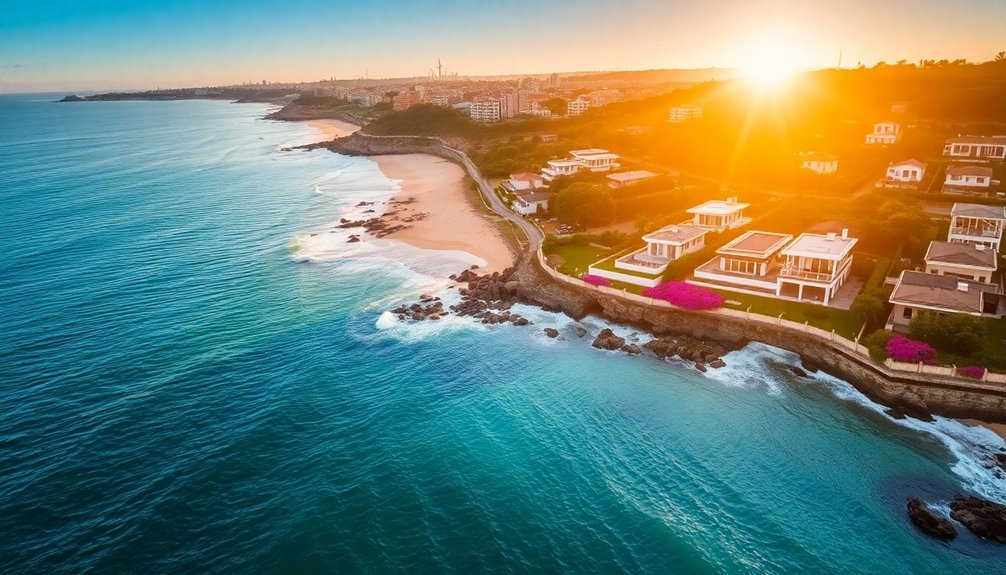
When it comes to coastal real estate opportunities in Portugal, the Algarve region stands out with its stunning landscapes and vibrant culture. You'll find promising investments along the Silver Coast, where property prices are on the rise, especially for vacation rentals. In addition to the Algarve, areas like Cascais also offer luxurious coastal living just a short drive from Lisbon, making them ideal for city connectivity. Whether you're seeking a sunny getaway or a lucrative rental income, the coastal properties here offer something for every investor.
Algarve Region Highlights
The Algarve region offers a wealth of coastal real estate opportunities, making it a top choice for property buyers. With its stunning landscapes and vibrant lifestyle, you'll find diverse property options that cater to all tastes and budgets.
Consider these enticing choices:
- Luxury villas with private pools and breathtaking ocean views in upscale areas like Vilamoura and Vale do Lobo.
- Charming traditional houses nestled in quaint villages such as Tavira and Vila do Bispo.
- Modern apartments featuring sea views and amenities in lively spots like Albufeira.
Popular investment locations, such as Lagos and Portimão, boast high capital appreciation potential and dynamic urban environments. Additionally, the Algarve region offers a diverse range of properties, including townhouses, villas, apartments, and building plots, catering to various preferences and budgets.
You'll enjoy world-class golf courses, diverse dining options, and an array of outdoor activities, from surfing to hiking. With over 300 days of sunshine annually, the Algarve promises a high quality of life and excellent accessibility through Faro airport.
Rental yields average around 5.6 percent, making this region not just a beautiful place to live but also a smart investment.
With the property market booming, it's the perfect time to explore the Algarve's coastal real estate opportunities.
Silver Coast Investments
If you're looking for coastal real estate opportunities beyond the Algarve, the Silver Coast presents an attractive alternative. Nestled between Lisbon and Porto, this region boasts charming towns like Ericeira, Peniche, Óbidos, and Nazaré, all easily accessible via the A8 motorway. With just 1.5 hours from Lisbon and 2.5 hours from Porto, it's perfect for those wanting coastal living while commuting to major cities.
One of the standout features is the affordability of properties compared to Lisbon and the Algarve. You can find houses ranging from €250,000 to €1 million, with two-bedroom apartments starting around €100,000. Average asking prices per square meter vary, with Nazaré at €2,483 and Peniche at €2,386, making it a wise investment for budget-conscious buyers. The Silver Coast is known for its stunning beaches and vibrant lifestyle, offering outdoor activities like surfing and golfing. The region's appeal is further enhanced by its growing tourism sector, which also stimulates local economies through increased visitor spending, making it a hotspot for potential investors. Additionally, the region is known for its commitment to renewable energy solutions, providing a sustainable living environment that attracts eco-conscious buyers.
With a growing tourism sector, it's ripe for investment, especially for short-term rentals. Additionally, the region is a renowned surf destination, attracting enthusiasts from all over the world. Plus, with options like the Golden Visa program, you can pave your way to residency while enjoying the coastal charm and rich culture of this beautiful region.
Vacation Rental Potential
Coastal real estate in Portugal offers lucrative vacation rental potential, attracting both investors and travelers alike. With a variety of stunning locations, the demand for vacation rentals remains high, guaranteeing consistent rental income.
Here are some enchanting features that make these properties stand out:
- Direct beach access in popular areas like Faro and São Vicente, perfect for sunbathing and swimming.
- Heated pools and spacious outdoor terraces, ideal for relaxation after a day of adventure.
- Breathtaking ocean views that provide a picturesque backdrop for your guests' stay.
Properties in the Algarve, Madeira, and the Azores boast high ratings, often exceeding 4.9 out of 5. Year-round tourist traffic guarantees that your investment can yield significant returns, making these coastal gems highly sought after. Additionally, the high demand for beach house rentals in Portugal ensures that your property will attract numerous guests throughout the year.
Additionally, understanding local regulations is essential, especially since some areas are no longer eligible for Golden Visa applications.
Whether you choose to invest in residential or commercial properties, the potential for a thriving vacation rental business is undeniably promising. With smart choices, you can tap into the vibrant coastal market and enjoy the benefits of Portugal's stunning landscapes.
Urban Investment Potential

With robust demand driving the real estate market in major cities like Lisbon and Porto, urban investment potential remains strong. This demand is fueled by ongoing urban development and increasing foreign investment, leading to significant appreciation in property values over the past decade.
As of 2024, the median house price in Portugal reached €1,736 per square metre, reflecting the economic and cultural appeal of these cities. Additionally, approximately 20% of property purchases are made by foreign investors, further highlighting the attractiveness of urban real estate in Portugal.
However, keep in mind that since 2022, you can't obtain a residence permit through purchasing residential property in Lisbon or Porto. Instead, consider investing in commercial properties or diversifying into areas like cultural heritage or scientific research, which are now eligible under the Golden Visa program.
Despite these restrictions, Portugal's real estate market has shown impressive resilience, especially post-COVID-19. The Housing Price Index hit 220.74 in the second quarter of 2024, demonstrating ongoing interest in urban properties.
Additionally, with average annual rental yields ranging from 5% to 7%, urban areas can provide stable income for investors. As the rental market evolves, you'll find promising opportunities for consistent returns in these vibrant cities.
Rural Property Investments

As urban investment in cities like Lisbon and Porto thrives, many investors are turning their attention to rural property investments in Portugal. The allure of rural properties lies not just in their picturesque landscapes, but also in their potential for diverse income streams.
You can find:
- Farmhouses nestled amidst olive groves and vineyards in the scenic Alentejo and Douro River regions, showcasing traditional Portuguese architecture.
- Equestrian properties that offer a blend of history and modern luxury, complete with gardens, storage areas, and often a swimming pool, perfect for a tranquil retreat.
- Vineyard estates that tap into Portugal's flourishing wine industry, ranging from modest farmyards to fully equipped vineyards, presenting lucrative investment opportunities. Additionally, many of these properties often come with sizable plots of land, which are suitable for outdoor activities and agricultural projects.
These properties vary greatly in price and type, accommodating budgets from under €250,000 to multi-million euro estates.
The charm of rural Portugal, with its serene nature and agricultural bounty, offers an attractive alternative for those looking to diversify their investments.
With the right property, you can enjoy both a peaceful lifestyle and a promising financial future.
Key Considerations for Buyers
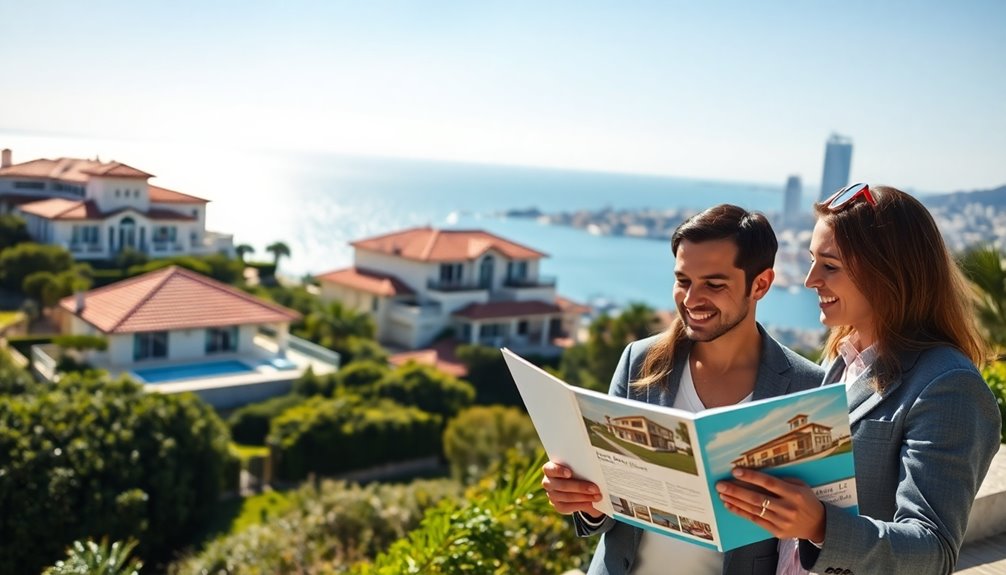
What should you know before diving into the property market in Portugal? First, you'll need to sign a promissory contract and pay a 10% deposit—keep in mind, this might be non-refundable if you back out.
For new developments, payments are often made in stages, so having a lawyer is essential. Once you're ready to finalize, you'll file a deed with a local notary to confirm your purchase. Additionally, it's important to engage reputable agents and legal professionals to facilitate the buying process.
Don't forget about taxes and fees. You'll need to pay the IMT tax before completion, with rates varying depending on the property type. For example, holiday homes can incur a tax of 1-8%, while rustic properties are usually at 5%.
If you're considering financing, you can often borrow up to 100% of the purchase price, but be aware of current high interest rates.
Lastly, if a Golden Visa interests you, remember the minimum investment is €500,000, and certain restrictions apply in big cities.
Understanding these key considerations will help you navigate the buying process more smoothly and guarantee a successful investment.
Frequently Asked Questions
Can Foreigners Buy Property in Portugal Without Residency?
Absolutely, you can buy property in Portugal without residency!
There's no restriction based on your nationality, and you enjoy the same rights as Portuguese citizens.
Whether you're interested in a cozy apartment in Lisbon or a beach house in the Algarve, you can own residential or commercial real estate without needing permanent residency or citizenship.
Just remember to do your due diligence and consider getting help from a local real estate agent or lawyer.
What Are the Maintenance Costs Associated With Portuguese Properties?
When you own a property in Portugal, it's wise to budget for maintenance costs. You should allocate about 1% to 4% of your property's value annually for upkeep.
Routine maintenance, like painting and minor repairs, helps maintain your home's condition. Be prepared for major repairs, which can be costly, and set aside funds for unexpected emergencies.
Location and property age can also influence these costs, so plan accordingly.
How Does Property Taxation Work in Portugal for Non-Residents?
You might think that owning property in Portugal as a non-resident is straightforward, but property taxation can be complex.
Non-residents are taxed at a flat 28% rate on rental income and 25% on general income. Capital gains from property sales also face a 28% tax.
You'll need a Tax Identification Number (NIF) and a local representative to handle your tax obligations.
Don't forget about additional taxes like AIMI and property transfer tax, either!
Are There Any Language Barriers in the Buying Process?
Yes, there are language barriers in the buying process if you don't speak Portuguese.
However, you can easily overcome them by working with English-speaking realtors, especially in popular areas like Lisbon or the Algarve.
They'll help you navigate negotiations, legalities, and cultural nuances, ensuring smooth communication.
With their expertise, you can confidently understand local laws and make informed decisions without worrying about misunderstandings.
What Should I Know About Property Insurance in Portugal?
When considering property insurance in Portugal, you should know that while it's not mandatory for everyone, mortgage holders must have at least fire insurance.
You can opt for basic coverage or extend it with multi-risk insurance, which offers broader protection.
Be aware of exclusions, like negligence or wear and tear.
Factors like property type, location, and value influence your premiums, so it's wise to compare policies to find the best fit for your needs.
Conclusion
As you commence your property journey in Portugal, remember that every decision counts. From understanding the Golden Visa to exploring coastal gems, each step opens a door to new possibilities. Will you find your dream home by the sea or a lucrative urban investment? The thrill of discovery awaits, but it's crucial to stay informed and prepared. So, what's next on your adventure? The perfect property might just be around the corner, and you wouldn't want to miss it!
